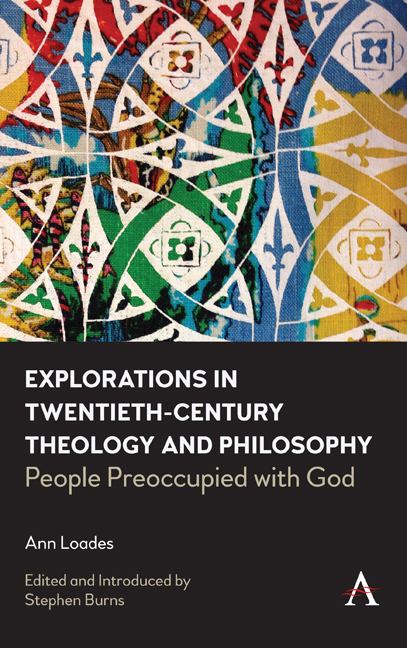Book contents
- Frontmatter
- Contents
- A Personal Note
- Foreword
- Introduction: The Grace of Intelligence
- Chapter One Evelyn Underhill (1875–1941): Mysticism and Worship
- Chapter Two Evelyn Underhill: As Novelist – Exploring Mysticism
- Chapter Three Dorothy L. Sayers (1893–1957): War and Redemption
- Chapter Four Dorothy L. Sayers: Are Women Human? Considering Dante’s Beatrice
- Chapter Five C. S. Lewis (1898–1963): On Gender
- Chapter Six C. S. Lewis: On Grief
- Chapter Seven Austin Farrer (1905–1968): Love Almighty and Ills Unlimited
- Chapter Eight Austin Farrer: And Friends
- Chapter Nine Simone Weil (1909–1943): Resistance and Writing
- Chapter Ten Simone Weil: Eucharistic Sacrifice – Exploring a Metaphor
- Chapter Eleven Stephen Sykes (1939–2014) and Colleagues: Exploring the Problematic Legacy of Power
- Afterword: The Passionate Intellect of Ann Loades
- Acknowledgements
- Bibliography
- Contributors
- Index
Chapter Six - C. S. Lewis: On Grief
Published online by Cambridge University Press: 18 November 2023
- Frontmatter
- Contents
- A Personal Note
- Foreword
- Introduction: The Grace of Intelligence
- Chapter One Evelyn Underhill (1875–1941): Mysticism and Worship
- Chapter Two Evelyn Underhill: As Novelist – Exploring Mysticism
- Chapter Three Dorothy L. Sayers (1893–1957): War and Redemption
- Chapter Four Dorothy L. Sayers: Are Women Human? Considering Dante’s Beatrice
- Chapter Five C. S. Lewis (1898–1963): On Gender
- Chapter Six C. S. Lewis: On Grief
- Chapter Seven Austin Farrer (1905–1968): Love Almighty and Ills Unlimited
- Chapter Eight Austin Farrer: And Friends
- Chapter Nine Simone Weil (1909–1943): Resistance and Writing
- Chapter Ten Simone Weil: Eucharistic Sacrifice – Exploring a Metaphor
- Chapter Eleven Stephen Sykes (1939–2014) and Colleagues: Exploring the Problematic Legacy of Power
- Afterword: The Passionate Intellect of Ann Loades
- Acknowledgements
- Bibliography
- Contributors
- Index
Summary
Readers of C. S. Lewis's A Grief Observed may be provoked yet again to evaluate Christian faith in divine sovereign goodness, notwithstanding evidence of the manifest and unambiguous evils of our lives. Joy Lewis's bone cancer is but one example. Joy's death in 1960 may have provoked not only her husband's text, but also Austin Farrer's Love Almighty and Ills Unlimited, published in 1962, one year after Lewis’s. In his last chapter on ‘Griefs and Consolations’ Farrer may well have had Lewis's text in mind. For Katharine and Austin Farrer were friends enough with the Lewises to have attended their extraordinary registry office wedding in April 1956 and Lewis's Reflections on the Psalms of 1958 is dedicated to them. And it was in October 1956 that Katharine had a premonition that something was wrong with Joy. She telephoned, but just before the phone rang, Joy tripped over the wire, felt her leg snap, and found herself helpless on the floor with the telephone receiver beside her, hearing Katharine's anxious voice at the other end. Austin himself, priest as well as friend, gave Joy final absolution on her deathbed, and read her burial service in stark Cranmerian form under the obvious stress of his own deep sorrow for her. In writing Love Almighty, however, Farrer could not refer to A Grief Observed as Lewis's own work. For Lewis had both revealed and hidden his grief and the logical impasse to which it had brought him by publishing his text, yet concealing the identity of those about whom he wrote. He referred to his wife as ‘H’ – the initial of Helen, her first name, and to himself, the author, as N. W. Clerk, a pseudonym he had used before for short pieces. The N. W. derived from an Anglo-Saxon phrase meaning ‘I know not whom’, and ‘Clerk’ meant simply one able to read and write. Farrer himself delivered the commemoration address in Oxford in honour of Lewis1 after the latter's death in 1963, speaking of him as put almost beside himself by Joy's death, of which only those who were aware of the identity of the author of A Grief Observed had unambiguous evidence. Then Farrer contributed a notable critique of Lewis as a Christian apologist in a collection published in 1965.
- Type
- Chapter
- Information
- Explorations in Twentieth-Century Theology and PhilosophyPeople Preoccupied with God, pp. 75 - 88Publisher: Anthem PressPrint publication year: 2023

